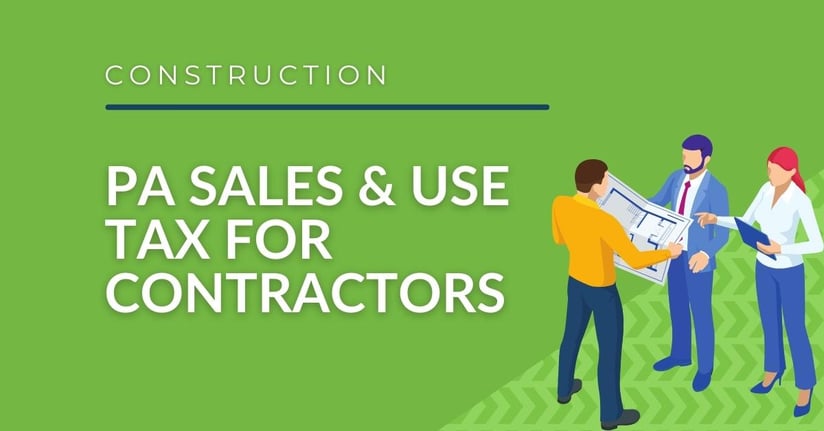Whether or not you are a construction contractor, the sales and use tax rules regarding this industry affect you. Many non-contractor businesses are surprised to learn during a state tax audit that what they thought was a nontaxable construction contract is actually considered by Pennsylvania to be a purchase of tangible personal property (TPP) with installation, thus exposing the business to use tax. To help Pennsylvania contractors and their customers better understand sales and use tax, let’s take a look at which party bears responsibility and whether the tax can be avoided completely via exemption claims.
First, a refresher on the basics: Generally, contractors are responsible for paying sales tax to their suppliers, or use tax directly to the state, on the cost of their materials when performing construction activities. On the other hand, if the contractor is performing sales activities, they should buy their materials tax-exempt for resale and then charge sales tax to their customers. The distinction between construction and sales activities is crucial. Without a proper understanding of which types of jobs fall into each category, the entire sales and use tax system can fall apart, with tax being paid by the wrong businesses on the wrong tax base, and with improper or missed exemption claims.
CONSTRUCTION ACTIVITIES VS. SALES ACTIVITIES
A thorough discussion of this distinction could take pages and still wouldn’t provide clear answers for every contractor. It can be a nuanced and complicated determination, which is why it comes up often in audit and sometimes has to be resolved by the courts. The essential premise is that a contractor is performing a construction activity when they attach or affix TPP to become a permanent part of real estate, and they are performing a sales activity when they install TPP that does not become a permanent part of the real estate. Although the regulations written in 1983 say the key is whether the TPP becomes a permanent part of the real estate, they don’t define when that happens.
The most authoritative discussion of whether TPP becomes a permanent part of real estate didn’t happen until 2011, when the Supreme Court of Pennsylvania issued a ruling regarding MRI and PET/CT Scan systems. The non-contractor medical businesses that bought these systems wanted them treated as a permanent part of real estate so they would not have to pay sales tax on them; instead, the contractor that installed them would have been responsible for use tax on their cost of materials. The court disagreed, saying that a determination on TPP permanence needs to consider the character of the object, its ability to be installed and removed, its degree of portability and whether it maintains its functional integrity after installation.
The regulation at 61 Pa. Code § 31.11 provides extensive lists of items that are presumed to become a permanent part of real estate (construction activities on which a contractor owes tax) versus items that are presumed to not become a permanent part of real estate (sales activities on which a contractor charges tax). These are valuable lists, but they are not all-encompassing; they only provide presumptions not certainties, and almost 40 years later, may be obsolete based on changes in construction technology. When considering your own contracts for construction versus sales activities, it is prudent to rely on a combination of the lists in the regulations with the overall concept defined by the court.
ACCEPTANCE OF EXEMPTION CERTIFICATES
Customers of contractors sometimes provide the contractor with an exemption certificate, raising the question of whether the customer’s exempt status can be used to avoid tax altogether. There are some instances where this is possible, discussed below. In any instance, a key to ensuring exemption is that the contractor exercises good faith in accepting the certificate. Good faith acceptance includes full completion of the certificate, receipt by the contractor within 60 days from the sale and consistency between the materials provided by the contractor and the exemption claimed by the customer. For example, a contractor could not accept an exemption for manufacturing equipment if they are installing racking at a warehouse facility that they know is not used for manufacturing.
Exemption certificates can allow tax to be avoided altogether in the context of manufacturing and public utilities. If a contractor is providing machinery, equipment or parts to a customer engaged in manufacturing, and those items will act upon or convey the manufactured product between the first and last production operation, then the exemption certificate will apply. This is true even if those items are considered construction activities because the items are affixed to real estate. Similarly, items used by a public utility directly in the rendition of their service can be purchased exempt, even if affixed to real estate. For example, sanitary sewers and water mains can be exempt.
Another primary use case for exemption certificates is building machinery and equipment that are part of a real property contract with a purely public charity, a governmental entity or a qualified business in a Keystone Opportunity Zone. For instance, while a boiler is ordinarily taxable to the contractor as a construction activity, if the contract is with one of these customer types, it qualifies as building machinery and equipment and the exempt status of the customer allows tax to be avoided altogether. The same is true for certain portions of electrical, HVAC and security systems, as well as a number of other items.
For construction contractors, some things in this realm of sales and use tax are easy. For instance, concrete blocks for a foundation, 2x4s for an exterior wall and drywall for a ceiling will always be considered construction activities where the contractor pays tax on the cost of the materials. But complications can arise quickly if the project is for a charity, governmental entity, manufacturer, medical facility or public utility or involves anything other than the basics of lumber, drywall, concrete, etc.
RKL’s state and local tax professionals are ready to assist contractors and their customers with proper determinations of sales and use tax in these scenarios, so that no one gets surprised with a large tax bill on audit.




